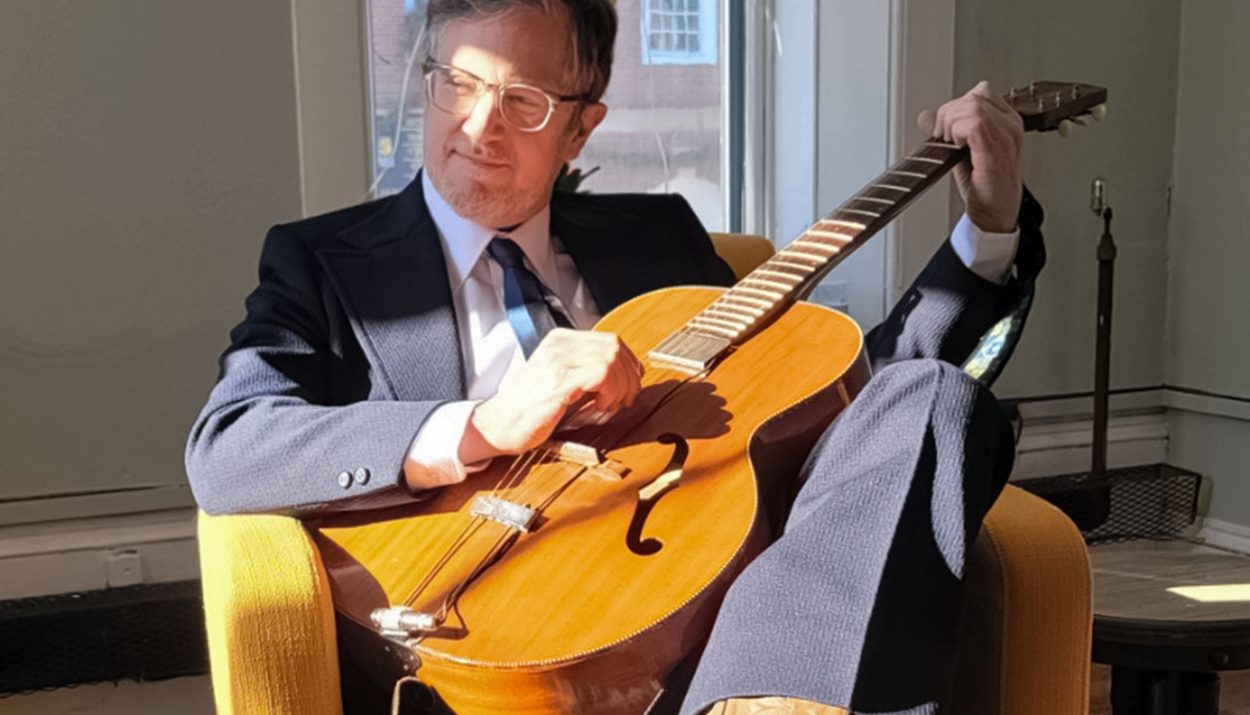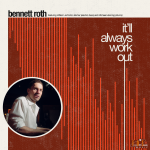From Weare, Joey Clark’s story is as rich and textured as the songs he reimagines. A Nashville veteran with over a decade of writing and performing under his belt, Clark has returned to his New England roots, bringing with him a deep well of musical experience and a passion for storytelling. His fourth album, “Portraits of Dylan,” is not just a tribute but a reinvention—ten Bob Dylan classics reimagined with fresh sonic landscapes and personal touches that showcase Clark’s unparalleled musicianship. Recorded as a 100% solo project, this album is an intimate and profound exploration of Dylan’s timeless catalog, featuring Clark on every instrument. At its heart is his vintage Alvarez Yairi DY57 guitar, a cherished piece of his journey, echoing the legacies of Jorma Kaukonen and Bob Weir. With a penchant for creating headphone-worthy interpretations, Clark expands the horizons of Dylan’s music while maintaining its soul.
The album opens with “I Shall Be Released,” and right from the start, Clark’s touch is clear. The bassline—just like Rick Danko’s work with The Band—offers a subtle but potent nod to roots rock. The song feels like a spiritual invocation, with Clark’s vocals rising and falling like waves, filled with a quiet urgency. The production is rich but never overwhelming; a delicate blend of acoustic guitar and harmonica adds a sense of nostalgia while keeping the track grounded at the moment.
Next up is one of the album’s most intriguing twists. Dylan’s “One More Cup of Coffee” is often recognized for its haunting, gypsy-style atmosphere, but Clark takes it in a wholly new direction. The track drifts into a psychedelic South-of-the-border air, where the rhythm section swells in a dreamy haze. Clark’s vocals are playful yet they carry the wistful weight of Dylan’s original version. The added percussion and slide guitar brings an edge of mystery, pushing the boundaries of the folk classic in an unexpected yet captivating way.
With “Tonight I’ll Be Staying With You,” Clark brings a warm, intimate touch to a song that has always felt like a quiet promise. In this rendition, his voice, slightly raspy and full of yearning, sits comfortably in the spaces between the lyrics, while the instrumentation mirrors the intimacy of the words. The piano subtly rises and falls behind the vocals, offering an emotional bed for the song to unfold. Every note feels deliberate yet free—allowing the track to gently sway without ever losing its depth.
Clark’s version of “You’re A Big Girl Now” is a rich tapestry of feeling. The piano weaves through the song like a guide, lighting up the darker undertones of the original. Clark’s vocal delivery carries a blend of melancholy and fondness, echoing the emotional complexity that Dylan masterfully captured. The production here is spacious, with touches that allow the song to breathe and grow without overwhelming you. There’s a sense of maturity in this version, as if Clark has aged alongside the song, finding new layers with each passing year.
“Maggie’s Farm” is perhaps the most rebellious moment in “Portraits.” It has always been a raucous anthem, and Clark takes it to new heights with a driving rhythm section that matches the song’s spirit. The guitars chime with a sense of urgency, while the percussion keeps things lively and upbeat. Clark’s vocals are assertive and commanding, channeling the frustration of the original while adding his contemporary edge. It’s the kind of track you’d want to hear live, the energy practically jumping off the speakers.
In “You’re Going To Make Me Lonesome When You Go,” Clark adds drums, giving Dylan’s already heartbreaking love song an extra layer of rhythm and depth. This small but powerful change brings a new dynamic to the piece, creating a sense of longing that hangs in the air, much like the space left by a lover’s departure. The percussion swirls gently, building the atmosphere around Clark’s plaintive vocals, making this one of the more haunting tracks on the album.
This rendition of “It’s All Over Now, Baby Blue” feels delicate and resigned, with Clark’s voice taking center stage in a near whisper. The arrangement is sparse, allowing the words to shine in their full emotional weight. The acoustic guitar and harmonica provide a timeless folk backdrop, while Clark’s delivery adds a personal, almost confessional touch to the song. The production is minimalistic, yet every note feels purposeful, creating a meditative atmosphere that lingers.
In “To Ramona,” Clark brings a refreshing new interpretation to this beloved Dylan classic. The harmonica adds a folk authenticity that’s expected, but it’s Clark’s vocals that elevate the song. There’s a warmth in his delivery that contrasts beautifully with the melancholy of the lyrics. The acoustic guitar, in particular, shines here, its intricate picking paying tribute to the original while carving out new space for Clark’s voice to explore.
With “Queen Jane Approximately,” Clark continues to showcase his impeccable ear for subtle musical experimentation. The instrumentation here is lush, and the arrangement feels expansive, with layers of harmonies supporting the lead vocal. Clark’s voice captures the wistfulness and confusion of the original, but there’s a newfound tenderness in the delivery that adds a sense of vulnerability to the character of Queen Jane. The production is intricate yet never overdone, allowing the song’s emotional core to shine.
The album closes with “When the Ship Comes In,” a song that resonates with a sense of hope and resolution. Clark’s voice soars in the final chorus, filled with conviction, and the arrangement swells around him, building to a climactic finish. The percussion and slide guitar here are especially powerful, giving the track a sense of movement that mirrors the song’s themes of change and eventual triumph. It’s a fitting end to an album that explores not just the music of Dylan but the journey through time, place, and personal discovery.
“Portraits of Dylan” is an album that blends the past and present with a subtle mastery. Joey Clark doesn’t just interpret Bob Dylan’s songs—he reinvents them, exploring new dimensions while staying true to their original spirit. From intricate guitar work to layered vocal harmonies, each track is a careful reimagining that invites listeners to experience Dylan’s legacy through a fresh lens. For those familiar with Clark’s earlier work, this album is a testament to his growth as both a musician and a storyteller. For new listeners, “Portraits of Dylan” offers a fascinating introduction to the talent and vision of an artist who is unafraid to forge his path, even while honoring the past.
Listen to the “Portraits of Dylan” album on Spotify
Follow Joey Clark here for more information






